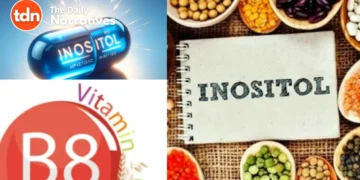Table of Contents
Inositol, a type of sugar naturally occurring in the body and found in some foods and supplements plays a role, in cell development and growth. Studies indicate that inositol offers health advantages, commonly used for conditions like metabolic syndrome and polycystic ovary syndrome (PCOS).
What exactly is inositol?
Inositol serves as a sugar naturally produced by the body to support cell structure. Can be sourced from foods such as meat, fruits, corn, beans, grains and legumes. While the average American diet supplies around 1 gram of inositol daily research suggests that incorporating an inositol supplement may lead to health benefits.
Often referred to as vitamin B8 though not classified as a vitamin per se research has highlighted the functions of inositol. Besides its role in cell membrane development this compound may impact insulin levels and certain brain chemical messengers. These effects could potentially influence the management of metabolic and mental health issues within the body.
When taken as a supplement different forms of inositol are recognized under names, like;
- Myo – inositol
- D-chiro-inositol
- Inositol hexaphosphate.
What advantages does inositol offer?
Inositol is essential, for the functioning and growth of your cells. While ongoing research continues people also utilize inositol for health purposes. Some potential benefits of inositol include;
- Decreasing the risk of developing metabolic syndrome.
- Alleviating symptoms associated with syndrome (PCOS).
- Lowering the likelihood of diabetes and premature birth.
- Reducing cholesterol levels.
- Enhancing insulin processing in the body.
- Possibly easing symptoms related to depression and other mood disorders.
Why do people use inositol?
Inositol is commonly used for a variety of health conditions. Studies have indicated that this supplement may be beneficial for;
Understanding of Metabolic Syndrome
Metabolic syndrome comprises risk factors that elevate your susceptibility to diseases such as diabetes, heart disease and stroke. These risk factors include;
excessive fat in your body.
Elevated triglyceride levels in the blood.
Low levels of “good” HDL cholesterol.
High blood pressure (hypertension).
Increased blood sugar levels (hyperglycemia).
By incorporating an inositol supplement into your routine you may better manage these metabolic risk factors.
Some studies suggest improvements in blood pressure as triglyceride, cholesterol and blood sugar levels, with inositol supplementation; however further research is necessary.
Polycystic ovary syndrome (PCOS)
Polycystic ovary syndrome (PCOS) is a disorder that affects women and individuals assigned female at birth.
Symptoms of PCOS include enlarged ovaries with cysts leading to issues such as infertility, irregular periods, acne, weight gain and excess hair growth.
Research indicates that taking an inositol supplement particularly when combined with folic acid can help alleviate PCOS symptoms. This may result in improved blood sugar levels reduced blood pressure, lower triglyceride levels, enhanced ovulation and increased chances of pregnancy. It is advisable to discuss starting any supplement for syndrome with your healthcare provider.
Gestational diabetes (GD) and preterm birth
Gestational diabetes (GD) can develop when blood sugar levels are elevated during pregnancy. This condition poses risks for complications during pregnancy including the potential for preterm birth (delivery before 37 weeks of gestation). Studies suggest that incorporating a supplement along with folic acid into your routine may reduce the risk of gestational diabetes and lower the chances of preterm birth. Prior, to introducing any supplements into your pregnancy regimen it is recommended to consult with your healthcare provider.
Depression
Feeling down and losing interest, in things you used to enjoy are signs of depression, a mental health condition. Some studies suggest that low levels of inositol in the brain might be linked to depression. Taking an inositol supplement could potentially help balance brain hormones like serotonin and dopamine which may lead to an improvement in symptoms. It’s important to consult your healthcare provider before starting any supplement for managing depression.
Panic Disorder
Panic disorder is a type of anxiety issue characterized by intense panic attacks accompanied by reactions. While research on this is limited some studies indicate that using an inositol supplement might help decrease both the frequency and intensity of panic attacks. It’s crucial to continue with your medications as directed and discuss any supplements with your healthcare provider before beginning them.
Bipolar Disorder
Bipolar disorder involves mood swings changes in thinking patterns, energy levels and behavior. Although research is not extensive some studies suggest that incorporating a supplement, into your treatment plan could potentially lessen the symptoms associated with disorder.
Make sure to consult with your doctor before you begin taking a supplement, for disorder.
Other medical conditions
Inositol is sometimes used for health issues. There isn’t as much scientific evidence supporting its effectiveness for the following;
Difficulty sleeping (insomnia).
Post traumatic stress disorder (PTSD).
Severe lung condition (acute respiratory distress syndrome. ARDS).
Type 2 diabetes.
Compulsive disorder (OCD).
Attention deficit/hyperactivity disorder (ADHD).
Dosage details
There is currently no official recommended daily intake of inositol so its advisable to seek guidance from your doctor on what dosage’s most suitable, for your needs.
“Most studies suggest taking 1,000, to 2,000 milligrams of inositol twice a day especially if you have conditions like syndrome or insulin resistance. However further research is needed in this area before recommending increased supplementation as part of your routine.”
Is inositol safe?
Healthcare professionals generally view inositol as safe when used in doses for up to 10 weeks. However it’s important not to discontinue any medications without consulting your healthcare provider. In cases inositol supplements may complement existing treatment plans than replace them.
While taking an inositol supplement you may experience some side effects such as;
Diarrhea.
Nausea.
Abdominal discomfort.
Fatigue.
Headaches.
Dizziness.
Editor’s Note:
Inositol is a type of sugar essential for cell growth and development. Research suggests that taking inositol as a supplement may offer health benefits. While additional research is warranted inositol could potentially aid in treating metabolic and mental health conditions. The supplement appears safe with side effects, at doses. Always consult your healthcare provider before incorporating any vitamins or supplements into your regimen.
Please note that product descriptions on our website are sourced from Amazon to ensure accuracy and comprehensiveness. We also used affiliate links for these products from which we may earn a small commission at no extra cost to you if you make a purchase through these links.


















































